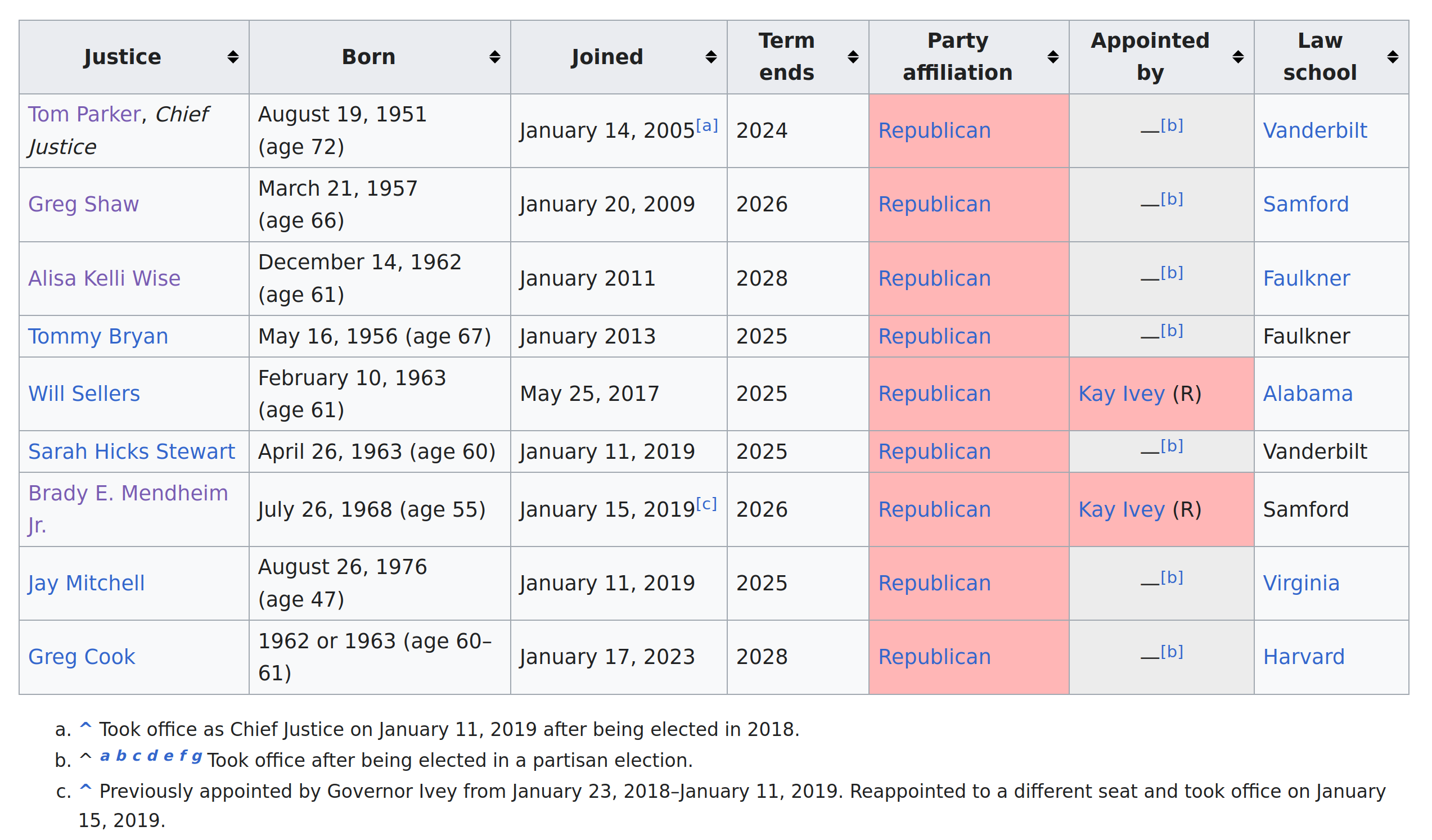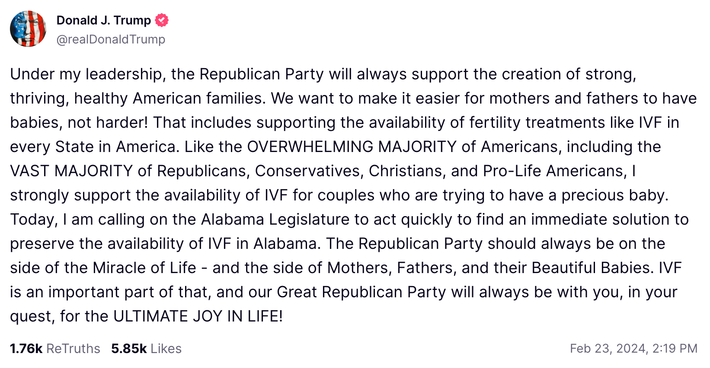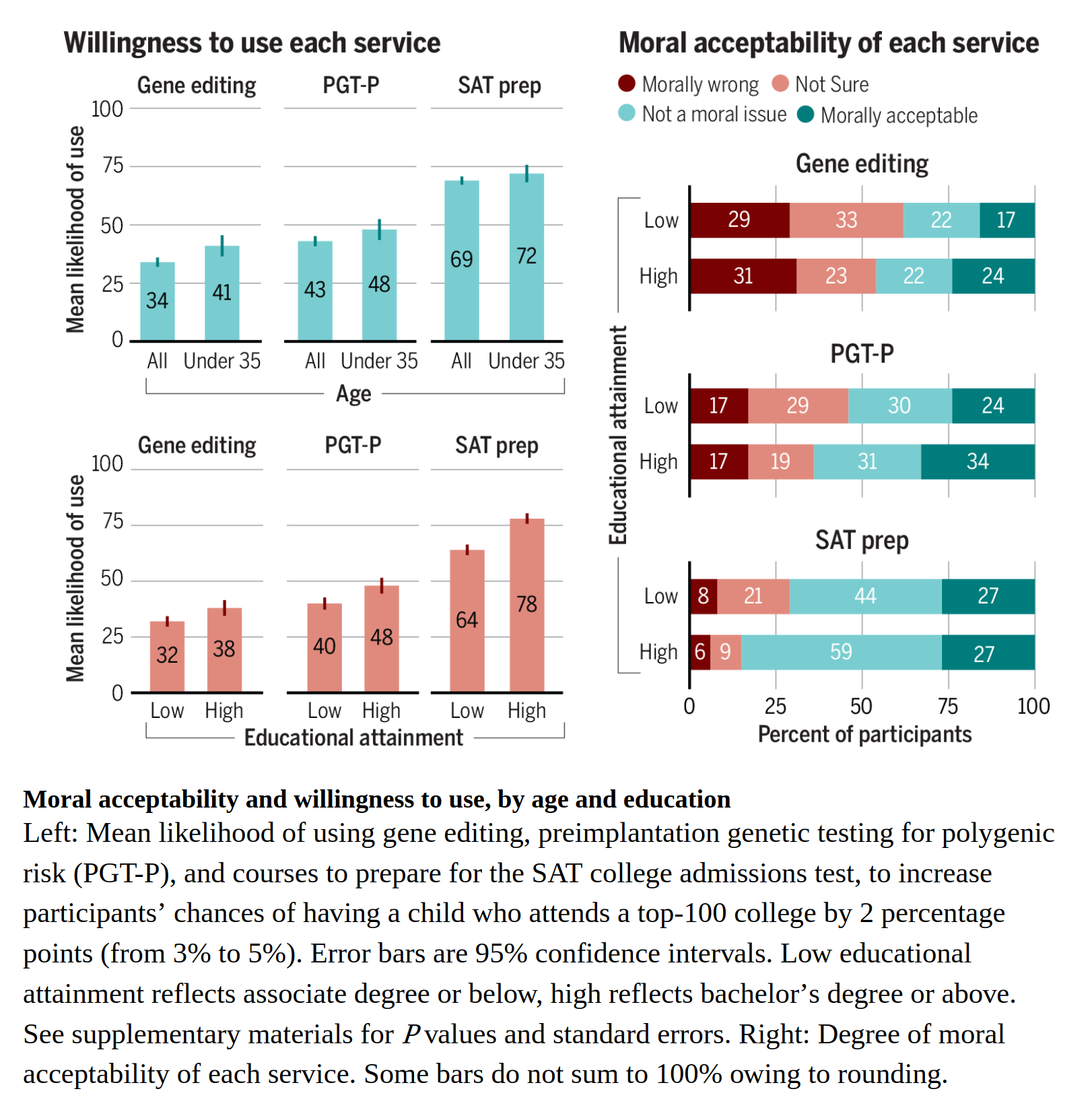You may have heard about the new Supreme Court of Alabama decision. You can read the full decision here, which I did (130 pages). The case is straightforward enough:
Facts and Procedural History
The plaintiffs in these consolidated appeals are the parents of several embryonic children, each of whom was created through in vitro fertilization (“IVF”) and — until the incident giving rise to these cases — had been kept alive in a cryogenic nursery while they awaited implantation. James LePage and Emily LePage are the parents of two embryos whom they call “Embryo A” and “Embryo B”; William Tripp Fonde and Caroline Fonde are the parents of two other embryos called “Embryo C” and “Embryo D”; and Felicia Burdick-Aysenne and Scott Aysenne are the parents of one embryo called “Baby Aysenne.”Between 2013 and 2016, each set of parents went to a fertility clinic operated by the Center for Reproductive Medicine, P.C. (“the Center”), to undergo IVF treatments. During those treatments, doctors were able to help the plaintiffs conceive children by joining the mother’s eggs and the father’s sperm “in vitro” — that is, outside the mother’s body. The Center artificially gestated each embryo to “a few days” of age and then placed the embryos in the Center’s “cryogenic nursery,” which is a facility designed to keep extrauterine embryos alive at a fixed stage of development by preserving them at an extremely low temperature. The parties agree that, if properly safeguarded, an embryo can remain alive in a cryogenic nursery “indefinitely” — several decades, perhaps longer.
The plaintiffs’ IVF treatments led to the creation of several embryos, some of which were implanted and resulted in the births of healthy babies. The plaintiffs contracted to have their remaining embryos kept in the Center’s cryogenic nursery, which was located within the same building as the local hospital, the Mobile Infirmary Medical Center (“the Hospital”). The Hospital is owned and operated by the Mobile Infirmary Association (“the Association”).
The plaintiffs allege that the Center was obligated to keep the cryogenic nursery secured and monitored at all times. But, in December 2020, a patient at the Hospital managed to wander into the Center’s fertility clinic through an unsecured doorway. The patient then entered the cryogenic nursery and removed several embryos. The subzero temperatures at which the embryos had been stored freeze-burned the patient’s hand, causing the patient to drop the embryos on the floor, killing them.
The plaintiffs brought two lawsuits against the Center and the Association. The first suit was brought jointly by the LePages and the Fondes; the second was brought by the Aysennes. Each set of plaintiffs asserted claims under Alabama’s Wrongful Death of a Minor Act, § 6-5- 391. In the alternative, each set of plaintiffs asserted common-law claims of negligence (in the LePages and Fondes’ case) or negligence and wantonness (in the Aysennes’ case), for which they sought compensatory damages, including damages for mental anguish and emotional distress. The plaintiffs specified, however, that their common-law claims were pleaded “in the alternative, and only [apply] should the Courts of this State or the United States Supreme Court ultimately rule that [an extrauterine embryo] is not a minor child, but is instead property.” In addition to those claims, the Aysennes brought breach-of-contract and bailment claims against the Center.
The Center and the Association filed joint motions in each case asking the trial court to dismiss the plaintiffs’ wrongful-death and negligence/wantonness claims against them in accordance with Rules 12(b)(1) and 12(b)(6), Ala. R. Civ. P. The trial court granted those motions. In each of its judgments, the trial court explained its view that “[t]he cryopreserved, in vitro embryos involved in this case do not fit within the definition of a ‘person’ ” or ” ‘child,’ ” and it therefore held that their loss could not give rise to a wrongful-death claim.
The trial court also concluded that the plaintiffs’ negligence and wantonness claims could not proceed. Specifically, the court reasoned that, to the extent those claims sought recovery for the value of embryonic children, the claims were barred by Alabama’s longstanding prohibition on the recovery of compensatory damages for loss of human life. And to the extent the claims sought emotional-distress damages, the trial court said that they were barred by the traditional limits to Alabama’s “zone of danger test,” which “limits recovery for emotional injury only to plaintiffs who sustained a physical injury … or were placed in immediate risk of physical harm ….” The trial court’s judgments disposed entirely of the LePages’ and the Fondes’ claims, and left the Aysennes with only their breach-of-contract and bailment claims. The Aysennes asked the trial court to certify its judgment as final under Rule 54(b), Ala. R. Civ. P., which the trial court did. Both sets of plaintiffs appealed.
TL;DR couples undergo IVF, but some 3rd party accidentally killed some of their frozen embryos. Is the IVF clinic liable for wrongful death? If embryos are more like physical property, then they might be liable for civil lawsuit about destroyed property instead.
The thing that struck me reading all the opinions is how much they agree with in each in principle about the role of lawmakers vs. courts:
3. The Defendants’ Public-Policy Concerns Cannot Override Statutory Text Finally, the defendants and their amicus devote large portions of their briefs to emphasizing undesirable public-policy outcomes that, they say, will arise if this Court does not create an exception to wrongful-death liability for extrauterine children. In particular, they assert that treating extrauterine children as “children” for purposes of wrongful-death liability will “substantially increase the cost of IVF in Alabama” and could make cryogenic preservation onerous. Medical Association of the State of Alabama amicus brief at 42; see also Appellees’ brief in appeal no. SC-2022-0515 at 36 (arguing that “costs and storage issues would be prohibitive”).
While we appreciate the defendants’ concerns, these types of policy- focused arguments belong before the Legislature, not this Court. Judges are required to conform our rulings “to the expressions of the legislature, to the letter of the statute,” and to the Constitution, “without indulging a speculation, either upon the impolicy, or the hardship, of the law.” Priestman v. United States, 4 U.S. (4 Dall.) 28, 30 n.1 in the reporter’s synopsis (1800) (Chase, J., writing for the federal circuit court).
Each of the dissenting opinions say the same thing. But how, then, do they reach opposite conclusions? It’s curious. It’s not because some of leftists and the others are conservatives. They are all conservatives:

Having read the debate, this is my summary:
While they agree courts shouldn’t just make up laws, they disagree about which prior cases and laws to draw upon. Some draw upon the constitution which basically says to favor the sanctity of life in questionable cases (they amended it in 2022). Others draw upon older case law. Who’s right? There doesn’t seem to be a fact of the matter.
The original laws from the 1800s obviously did not include anything about frozen embryos from IVF, so there was no original intent as to what should be done with these cases. One justice uses this to reason to the negative, that is, if embryos weren’t considered part of the original intent, they should not be included. It’s easy to come up with counter-examples as to why this line of reasoning is questionable. If someone froze themselves using cryogenics, and another person turned it off, would that be murder or wrongful death? As far as I know, no lawmaker has ever mentioned this when discussing the definition of murder. Various legal definitions of “person” aren’t helpful either, because it is not entirely clear if cryopreserved humans count as alive. Currently, they are de facto dead since we don’t know how to resurrect them, or if it is even possible in the future.
The public policy consequences arguments seem to be correct. Multiple fertility centers have already stopped doing business there as a consequence:
- Pauses on embryo transfers out of Alabama leave IVF patients with few options
- Three Alabama clinics pause IVF services after court rules that embryos are children
- Alabama’s biggest hospital to suspend transfer of embryos after court ruling
- etc.
As one justice wrote in his dissent:
The main opinion’s holding will mean that the creation of frozen embryos will end in Alabama. No rational medical provider would continue to provide services for creating and maintaining frozen embryos knowing that they must continue to maintain such frozen embryos forever or risk the penalty of a Wrongful Death Act claim for punitive damages.54
There is no doubt that there are many Alabama citizens praying to be parents who will no longer have that opportunity. And, there is no doubt that there will be fewer babies born. On the other hand, there are powerful moral and policy arguments supporting the notion that ending the creation, use, and destruction of frozen embryos is a good thing and that IVF technology has the potential for grave misuse.
Predictably, outside observers have mostly questioned the decision. Even Trump wrote something:

President Joe Biden condemned the recent Alabama court ruling that grants legal rights to frozen embryos, asserting that the decision is a consequence of the Supreme Court’s overturning of Roe v. Wade, reported The Hill.
The president also attributed the ruling to former President Donald Trump’s influence on the judiciary through appointing conservative justices to the Supreme Court.
They are both right. Trump’s lucky filling of the Supreme Court of the United States with conservatives allowed them to overrule the crazy Roe vs. Wade law. That law essentially made it impossible for states or the federal government to regulate certain matters of human reproduction. With that decision gone, states and their courts are free to make and interpret laws on their own, and at their own peril too. Trump himself appears to be pro-IVF (and abortion), but also pro-freedom of states to do their own thing on this matter.
The fall of Roe vs. Wade also meant that the federal and state governments are free to regulate IVF in terms of embryo selection. And we might suspect they will because of public sentiments regarding applied biotechnology:

Looking at the results, there are only really two findings: 1) more educated people are more in support, and 2) younger people are more in support. Forecasting into the future, then, is easy because the future generations and the elites are aligned in a pro-freedom direction. However, that doesn’t mean they won’t regulate it. Regulation could mean death to the various start-ups in the area. Regulation in many European countries already has massive impact on what people do. Some countries, like Germany, are extremely strict, and basically don’t allow any useful selection to take place. As a consequence, Germans often go to Denmark or the Czech Republic (the latter is also half the price).
If USA throws away its current friendly legal environment regarding IVF and embryo selection, this would be an opportunity for libertarian start-up states like Prospera. If regulations kill or severely hamstring embryo selection in the previously “wild west” USA, companies will move their business elsewhere. In general, there seems to be little legal clarity on what exactly the law says about the selection. The IVF-embryo selection procedure has many steps, and it is not clear at which exact step the potentially illegal selection might take place:
- At the making of the genetic predictions, since these allow selection for disallowed phenotypes?
- At them choosing of the desired embryo for implantation, the actual choosing? If so, which location should be used? Parents might be in one or two different countries than the genetic counselor, the IVF clinic, and the genetic prediction company.
- At the embryo transfer itself? Does that mean that patients can simply fly to some IVF clinic in a more friendly legal environment (or do it on a cruise ship in international waters, kinda like Seasteading) and fly back with their embryo in the womb? If not, are states really prepared to force abortions from such illegal selections, or will they just deliver fines?
As far as I know, no legal case has yet been filed anywhere about doing the wrong kind of selection. But maybe I just don’t know enough about such cases. Please post in comments if you know if any legal cases.
